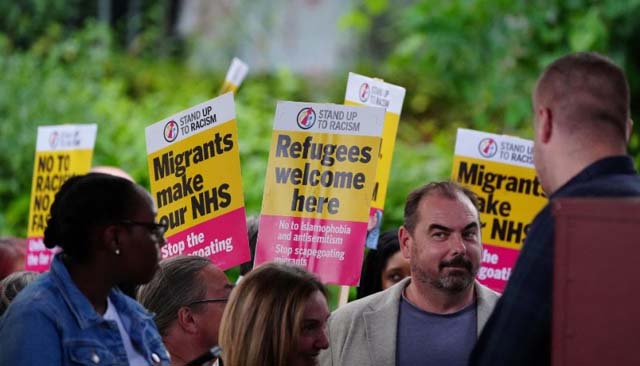
LONDON, June 30, 2024 (BSS/AFP) - Britain's state-funded National Health Service is hugely reliant on migrant workers, yet politicians have vowed to slash immigration as they fight for votes before Thursday's general election.
The governing right-wing Conservatives and the main opposition centre-left Labour Party, which is tipped to win the national vote, each pledge action over the key battleground yet seek to safeguard the UK's cherished but stretched NHS.
Conservatives want to hike the minimum salary required for a UK skilled-worker visa to crack down on the country's record migration levels, but opponents argue this will worsen recruitment.
Labour wishes to recruit and train more UK staff, arguing that the NHS has been starved of cash by 14 years of Tory government and become too reliant on overseas staff.
The topic also grabbed voters' attention after Brexit champion Nigel Farage last month took the helm of hard-right minority party Reform UK, which vows to freeze immigration altogether.
Yet from hospital wards and emergency departments to opticians and laboratories, foreign workers are vital to the NHS, which provides universal healthcare free at the point of delivery -- but has been plagued in recent years by strikes over pay.
- 'Heart of the nation' -
Commentators and industry experts warn about curbing the inflow of health workers, while a London museum exhibition highlights their often-overlooked vital role.
"It's an enormous institution, something like one in 10 workers in the UK works for the NHS," said Matthew Plowright, communications director at the Migration Museum.
"From the beginning... it's needed people from all over the world."
The museum features an exhibition entitled "Heart of the Nation", detailing how thousands of doctors and nurses from across the world have joined the NHS since its creation in 1948.
It shows how many health workers escaped the war-ravaged UK to pursue new lives in Australia, Canada and the United States, sparking a shortage of staff which prompted authorities to recruit abroad -- especially from countries from the former British empire, including in the Caribbean.
The NHS of today employs about 1.2 million full-time staff in England but about one fifth are non-British -- with Indian, Filipino and Nigerian the most common out of more than 200 different nationalities.
Staffing levels are deemed too low, however, especially for nurses.
"The UK is very reliant on international recruitment for its nursing workforce," noted Martyn Campbell, international policy expert at the Royal College of Nursing.
"Of all countries in the world, we're one of the most dependent ones," he told AFP.
- 'Workforce crisis' -
Naomi Fulop, professor of healthcare organisation and management at University College London, added that the entire UK sector suffers from a labour crisis.
"It's a workforce crisis and it's in the NHS. It's also in the care sector," said Fulop.
"There's the lack of training (and) the lack of new people coming in."
Britain issues health and care worker visas to help plug chronic staff shortages.
Many exhausted health workers have chosen to leave the profession in the wake of the Covid crisis.
Britain's departure from the European Union in early 2021 has meanwhile curbed the influx of key health workers, as well as those in other sectors such as tourism, hospitality and agriculture.
"There's recently, and particularly since the pandemic, high levels of stress that have caused people to leave" the NHS, said Fulop.
"So there's a retention problem, doctors, nurses and others, retiring early.
"Brexit has contributed so that the source of staff that the NHS had from EU countries has dried up," she added.